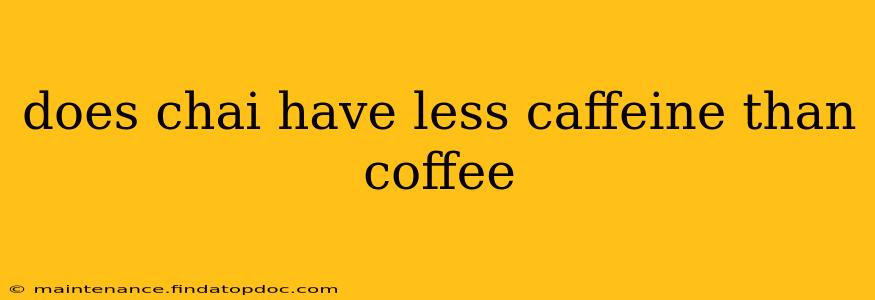Chai, the beloved spiced tea beverage, and coffee, the ubiquitous morning pick-me-up, are both popular caffeinated drinks. But which one packs a stronger caffeine punch? The simple answer is yes, chai generally has less caffeine than coffee. However, the caffeine content can vary significantly depending on several factors. Let's delve deeper into this comparison.
How Much Caffeine is in Chai?
The caffeine content in chai depends heavily on the type of tea used as its base. Most chai recipes utilize black tea, which itself contains caffeine. However, the amount of black tea used in a serving of chai can vary widely, from a strong brew to a more diluted version. Furthermore, the addition of milk and spices doesn't affect the caffeine levels significantly.
Generally, a cup of chai made with black tea contains between 25 and 50 milligrams of caffeine. This is a significant range, and the actual amount will depend on the specific recipe and brewing method. Some chai lattes, particularly those made with stronger black teas and larger quantities of tea, might have caffeine closer to the higher end of this range.
How Much Caffeine is in Coffee?
Coffee, on the other hand, is a significantly stronger caffeine source. The caffeine content in a cup of coffee varies based on several factors:
- Type of bean: Arabica beans generally have less caffeine than Robusta beans.
- Roast level: Darker roasts tend to have slightly less caffeine than lighter roasts, although the difference isn't dramatic.
- Brewing method: Different brewing methods extract varying amounts of caffeine. Espresso, for example, is often more concentrated than drip coffee.
- Cup size: A larger cup of coffee naturally contains more caffeine.
A typical 8-ounce cup of brewed coffee can contain anywhere from 80 to 175 milligrams of caffeine, and even more in specialty drinks like lattes or cappuccinos.
Does the Type of Chai Matter?
Yes, the type of tea used to make chai significantly impacts its caffeine content. While most chai uses black tea, some variations might use green tea or other tea types with lower caffeine levels. Therefore, a chai made with green tea will have considerably less caffeine than one made with black tea.
What About Decaf Chai?
For those sensitive to caffeine, decaf chai offers a delicious alternative. Decaf chai is made with decaffeinated black tea, greatly reducing the caffeine content. However, it's important to note that even decaf tea still contains trace amounts of caffeine.
What About Masala Chai?
Masala chai, a popular variation, typically uses black tea as its base, resulting in a caffeine level comparable to other chai varieties. The added spices do not affect the caffeine content.
Is Chai a Healthier Alternative to Coffee?
While chai generally has less caffeine than coffee, neither drink is inherently "healthier." Both can be part of a balanced diet, but moderation is key. The added spices in chai may offer some potential health benefits, such as antioxidants, but this doesn't negate the effects of caffeine.
Conclusion:
In conclusion, chai typically contains less caffeine than coffee. However, the caffeine content in both beverages can vary significantly based on various factors. If you're sensitive to caffeine or looking for a milder caffeinated beverage, chai can be a preferable choice. But always check the specific chai and coffee products you're consuming to determine their caffeine content accurately.
